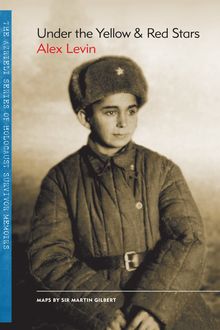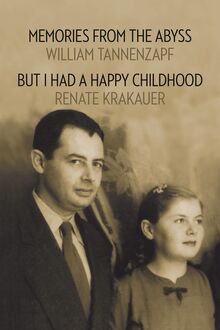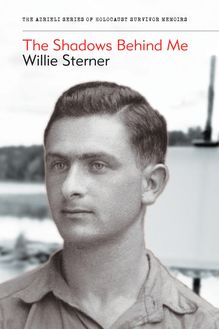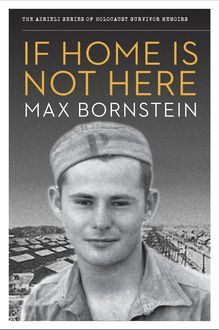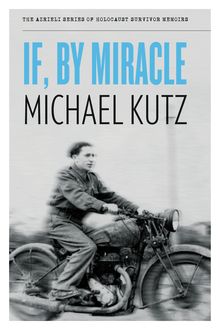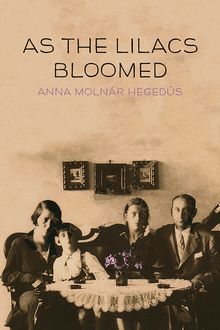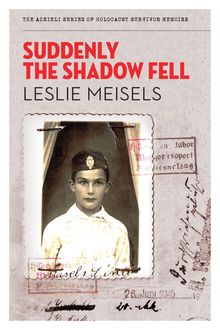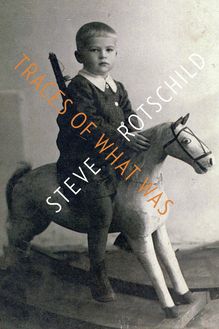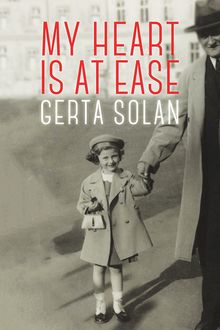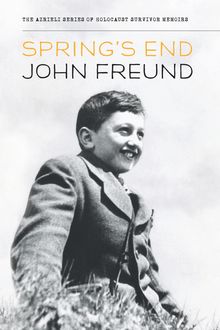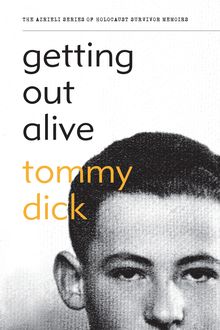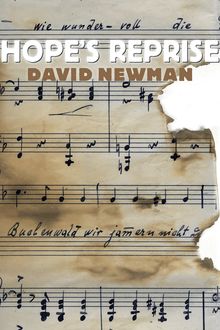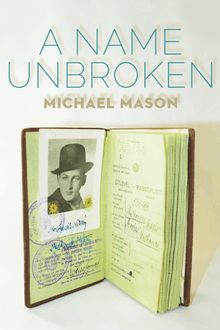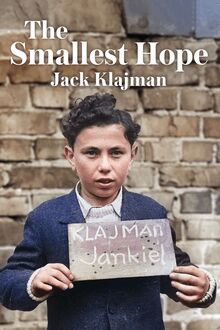-
 Univers
Univers
-
 Ebooks
Ebooks
-
 Livres audio
Livres audio
-
 Presse
Presse
-
 Podcasts
Podcasts
-
 BD
BD
-
 Documents
Documents
-
- Cours
- Révisions
- Ressources pédagogiques
- Sciences de l’éducation
- Manuels scolaires
- Langues
- Travaux de classe
- Annales de BEP
- Etudes supérieures
- Maternelle et primaire
- Fiches de lecture
- Orientation scolaire
- Méthodologie
- Corrigés de devoir
- Annales d’examens et concours
- Annales du bac
- Annales du brevet
- Rapports de stage
La lecture à portée de main
Vous pourrez modifier la taille du texte de cet ouvrage
Découvre YouScribe en t'inscrivant gratuitement
Je m'inscrisDécouvre YouScribe en t'inscrivant gratuitement
Je m'inscrisEn savoir plus
Vous pourrez modifier la taille du texte de cet ouvrage
En savoir plus

Description
Sujets
Informations
| Publié par | Azrieli Foundation |
| Date de parution | 01 septembre 2014 |
| Nombre de lectures | 1 |
| EAN13 | 9781897470831 |
| Langue | English |
| Poids de l'ouvrage | 2 Mo |
Informations légales : prix de location à la page 0,0300€. Cette information est donnée uniquement à titre indicatif conformément à la législation en vigueur.
Extrait
Suddenly the Shadow Fell
Leslie Meisels
WITH A SHORT MEMOIR BY HIS WIFE, EVA MEISELS, AND AN INTRODUCTION BY ANNA PORTER
The Azrieli Series of Holocaust Survivor Memoirs
INTERNATIONAL ADVISORY COUNCIL
Doris Bergen, Chancellor Rose and Ray Wolfe Chair in Holocaust Studies, University of Toronto
Sara R. Horowitz, Director of the Israel and Golda Koschitzky Centre for Jewish Studies, York University
Nechama Tec, Professor Emerita of Sociology, University of Connecticut
Avner Shalev, Chairman of the Yad Vashem Directorate, Jerusalem
Naomi Azrieli, Publisher
Andrea Knight, Managing Editor
Jody Spiegel, Program Director
Arielle Berger, Editor
Elizabeth Lasserre, Senior Editor, French-Language Editions
Aurélien Bonin, Assistant Editor / Researcher, French-Language Editions
Elin Beaumont, Educational Outreach and Communications
Tim MacKay, Social Media and Marketing
Susan Roitman, Executive Coordinator (Toronto)
Mary Mellas, Executive Coordinator (Montreal)
Michaela Ryan, Program Assistant
Mark Goldstein, Art Director
Nicolas Côté, Layout, French-Language Editions
François Blanc, Cartographer
Contents
The Azrieli Series of Holocaust Survivor Memoirs
Series Preface: In their own words...
About the Glossary
Introduction
Dedication
Author’s Preface
A Fragile Peace
Surrounded by Silence
A Brief Respite
The Sonderlager
Liberation
What Would Our Future Hold?
Reunion
Epilogue
Eva Meisels’ Memoir
Glossary
Leslie Meisels: Photographs
Eva Meisels: Photographs
Copyright
About the Azrieli Foundation
Also Available
Series Preface: In their own words...
In telling these stories, the writers have liberated themselves. For so many years we did not speak about it, even when we became free people living in a free society. Now, when at last we are writing about what happened to us in this dark period of history, knowing that our stories will be read and live on, it is possible for us to feel truly free. These unique historical documents put a face on what was lost, and allow readers to grasp the enormity of what happened to six million Jews – one story at a time.
David J. Azrieli , C.M., C.Q., M.Arch
Holocaust survivor and founder, The Azrieli Foundation
Since the end of World War II , over 30,000 Jewish Holocaust survivors have immigrated to Canada. Who they are, where they came from, what they experienced and how they built new lives for themselves and their families are important parts of our Canadian heritage. The Azrieli Foundation’s Holocaust Survivor Memoirs Program was established to preserve and share the memoirs written by those who survived the twentieth-century Nazi genocide of the Jews of Europe and later made their way to Canada. The program is guided by the conviction that each survivor of the Holocaust has a remarkable story to tell, and that such stories play an important role in education about tolerance and diversity.
Millions of individual stories are lost to us forever. By preserving the stories written by survivors and making them widely available to a broad audience, the Azrieli Foundation’s Holocaust Survivor Memoirs Program seeks to sustain the memory of all those who perished at the hands of hatred, abetted by indifference and apathy. The personal accounts of those who survived against all odds are as different as the people who wrote them, but all demonstrate the courage, strength, wit and luck that it took to prevail and survive in such terrible adversity. The memoirs are also moving tributes to people – strangers and friends – who risked their lives to help others, and who, through acts of kindness and decency in the darkest of moments, frequently helped the persecuted maintain faith in humanity and courage to endure. These accounts offer inspiration to all, as does the survivors’ desire to share their experiences so that new generations can learn from them.
The Holocaust Survivor Memoirs Program collects, archives and publishes these distinctive records and the print editions are available free of charge to libraries, educational institutions and Holocaust-education programs across Canada. They are also available for sale to the general public at bookstores.
The Azrieli Foundation would like to express appreciation to the following people for their invaluable efforts in producing this book: Sherry Dodson (Maracle Press), Sir Martin Gilbert, Farla Klaiman, and Margie Wolfe and Emma Rodgers of Second Story Press.
About the Glossary
The following memoir contains a number of terms, concepts and historical references that may be unfamiliar to the reader. For information on major organizations; significant historical events and people; geographical locations; religious and cultural terms; and foreign-language words and expressions that will help give context and background to the events described in the text, please see the Glossary .
Introduction
The catastrophe of Hungarian Jewry during World War II came late. Its speed and ferocity were unrivalled, as was the unwillingness of those caught up in its maw to foresee its inevitability.
The First Anti-Jewish Law in twentieth-century Europe was introduced in Hungary as early as 1923 but, given that Jews had been relatively well integrated into Hungarian society since the latter half of the nineteenth century, most Hungarian Jews did not consider this to be a serious threat. It limited the number of Jews admitted to universities to 6 per cent, the percentage of Jews in the general population, but it was allowed to lapse eight years later. Nevertheless, it did end up being a harbinger of worse to come.
In the aftermath of World War I , conditions in Hungary changed dramatically. At Trianon, a sideshow to the main treaty negotiations at Versailles that ended the war, Hungary lost two-thirds of its territory and three-fifths of its people. By a stroke of a pen, Transylvania became part of Romania, the Upper Province part of Czechoslovakia and the Bácska area part of Yugoslavia. 1 There is little doubt that Hungary suffered the harshest terms dealt out by the victorious Allies. The diminution of the country has haunted Hungarians for the rest of the twentieth century and even the beginning of the twenty-first.
Throughout the 1930s, Hungary developed closer ties to Germany, which shared Hungary’s outrage and bitterness over the treaty conditions imposed on both countries. In January 1933, Adolf Hitler, head of the National Socialist Party – the Nazis – became chancellor of Germany. The Nazis established the Geheime Staatspolizei, or Gestapo, with powers to arrest, interrogate and imprison without due process, and violent attacks on Jews in Germany became the norm, not the exception. As antisemitism rose in Germany, the contagion began to spread to other European countries and Jews began to look for safe havens.
Refugees flooded into Hungary. In 1938–1939, following the annexation of Austria and the occupation of Czechoslovakia, between 15,000 and 35,000 of those refugees were Jews from Austria, Germany, Poland and Slovakia. Hungarian Jews, however, still felt that the turmoil would pass them by, that they would be protected by the laws and by their fellow citizens in the place that had been their homeland for a thousand years. Not only were there Jewish politicians, academics, journalists, businessmen, land owners, industrialists, poets, writers, doctors, lawyers, famous actors and impresarios – as there were in Poland and Czechoslovakia – but in Hungary Jews had experienced unprecedented tolerance. When Germany occupied and annexed Austria in 1938, in what the Germans termed a friendly gesture, Hungarian Jews still felt secure. They had fought with honour in World War I , thousands were decorated and wore their medals with pride. Most Jews viewed themselves as Hungarians who, incidentally, were of the Jewish faith. Many of them followed no organized religion at all.
When Germany was awarded the Sudetenland at the infamous Munich conference in September of 1938, the Hungarian press was quick to echo Hitler’s demand for “lebensraum” – living space – and it was generally assumed that he would be satisfied with the new Sudeten territory. Admiral Miklós Horthy, Hungary’s interwar and wartime leader, was rewarded for his support for Germany’s expansion into Czechoslovakia and Austria when Hitler allowed Hungary to annex part of Magyar-speaking Slovakia and Carpathian Ruthenia, lands taken from Hungary in the Treaty of Trianon.
Jews continued to pay little heed when, in May 1939, the Hungarian parliament enacted a stronger version of the lapsed Anti-Jewish Law that restricted the number of Jews in commercial enterprises, the press, in law, and medicine to no more than 20 per cent. This Second Anti-Jewish Law was an imitation of Germany’s Nuremberg Laws and, for the first time, defined Jews in Hungary as a race. It provided for the retirement of all Jewish members of the judiciary, cancelled Jews’ right to vote in elections, and provided for the formation of a labour service that would eventually force 150,000 Jewish men into military service without guns or rights. Many members of the Hungarian Jewish elite saw this as an effort to appease both the rising right-wing in Hungary and Hitler, whose views on Jews were known from his popular and rabidly antisemitic book, Mein Kampf.
World War II began with the invasion of Poland on September 1, 1939;
-
 Univers
Univers
-
 Ebooks
Ebooks
-
 Livres audio
Livres audio
-
 Presse
Presse
-
 Podcasts
Podcasts
-
 BD
BD
-
 Documents
Documents
-
Jeunesse
-
Littérature
-
Ressources professionnelles
-
Santé et bien-être
-
Savoirs
-
Education
-
Loisirs et hobbies
-
Art, musique et cinéma
-
Actualité et débat de société
-
Jeunesse
-
Littérature
-
Ressources professionnelles
-
Santé et bien-être
-
Savoirs
-
Education
-
Loisirs et hobbies
-
Art, musique et cinéma
-
Actualité et débat de société
-
Actualités
-
Lifestyle
-
Presse jeunesse
-
Presse professionnelle
-
Pratique
-
Presse sportive
-
Presse internationale
-
Culture & Médias
-
Action et Aventures
-
Science-fiction et Fantasy
-
Société
-
Jeunesse
-
Littérature
-
Ressources professionnelles
-
Santé et bien-être
-
Savoirs
-
Education
-
Loisirs et hobbies
-
Art, musique et cinéma
-
Actualité et débat de société
- Cours
- Révisions
- Ressources pédagogiques
- Sciences de l’éducation
- Manuels scolaires
- Langues
- Travaux de classe
- Annales de BEP
- Etudes supérieures
- Maternelle et primaire
- Fiches de lecture
- Orientation scolaire
- Méthodologie
- Corrigés de devoir
- Annales d’examens et concours
- Annales du bac
- Annales du brevet
- Rapports de stage

